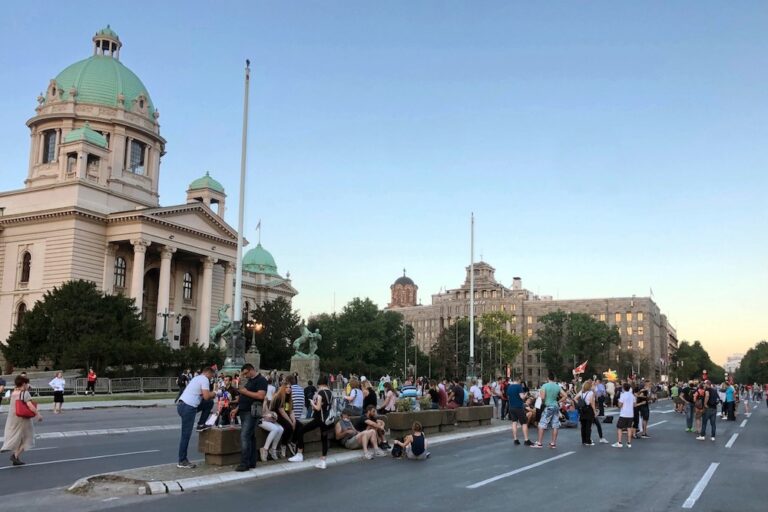(CPJ/IFEX) – CPJ has joined the International Federation of Journalists (IFJ) and other press freedom groups in condemning the predawn 21 April 1999 NATO air attack that knocked three television channels in Belgrade off the air. CPJ and other members of the International Freedom of Expression Exchange (IFEX) signed the IFJ’s 21 April letter to […]
(CPJ/IFEX) – CPJ has joined the International Federation of Journalists
(IFJ) and other press freedom groups in condemning the predawn 21 April 1999
NATO air attack that knocked three television channels in Belgrade off the
air. CPJ and other members of the International Freedom of Expression
Exchange (IFEX) signed the IFJ’s 21 April letter to NATO Secretary General
Javier Solana protesting the bombing of commercial broadcast outlets. NATO
targeted a 20-story office building in the Yugoslav capital that contained
the broadcast facilities of TV Pink, BK TV and TV Kosova, the latter a
station owned by President Milosevic’s daughter, Marija. The letter
expresses concern about NATO’s policy reversal targeting civilian broadcast
facilities, which jeopardizes the safety of all journalists working in
Yugoslavia. NATO has so far hit up to a dozen television transmitters in
Kosovo and Vojvodina.
**New cases and updates to IFEX alerts of 22 April, 21 April, 19 April, 13
April, 12 April, 9 April and 8 April 1999**
During a visit to CPJ’s New York office on 19 April, Kosovar Albanian
journalist Aferdita Kelmendi described how Serbian paramilitaries forced her
to leave Pristina on 29 March after hiding for five days in various
hideaways throughout the city. “We knew that as journalists we would be a
target,” said Kelmendi, who served as director of Pristina’s Radio 21, one
of only three independent broadcast media outlets in Kosovo, all now shut
down by Serbian authorities. Kelmendi said she hid nearby and watched as
Serbian police ransacked Radio 21’s studios shortly before she and her
family were ordered to leave Pristina immediately and head to Macedonia.
Kelmendi and six family members waited at the border with thousands of other
deportees for three days without any food before they were allowed into
Macedonia. Since that harrowing experience, Kelmendi has been trying to
locate her colleagues and is deeply concerned for their safety. She has been
unable to confirm a Deutche Welle radio report that one of her
correspondents, Gasmin Berisha, had been killed along with his father and
brother in the Kosovo town of Suva Reka. Kelmendi plans to resume Radio 21
broadcasts over the internet from her new temporary base in Skopje as a
service to her former listeners now in exile, whom she said “desperately
need information from their own newspaper or radio station because they
trust us.”
Hans-Peter “Pit” Schnitzler, a correspondent for Germany’s SAT-1 television
station, has been reported missing since 16 April. His editors say they lost
contact with their 56-year-old southeast Europe correspondent after he left
Belgrade for the Croatian border. Schnitzler decided to leave Yugoslavia
after his car and equipment were confiscated by Serbian authorities,
rendering it difficult for him to continue filing reports from Belgrade.
During that attack, Schnitzler was held at gunpoint and forced to turn over
his cell phone and PIN number, needed for access to the phone. On 20 April,
NATO voiced concerns about Schnitzler’s disappearance. Serbian authorities
told the Japanese consul in Belgrade, who now represents Germany’s interests
in Yugoslavia, that Schnitzler was in good condition, but they refused to
disclose why or where he is being held.
Lucia Annunziata, a prominent Italian TV journalist, was detained at the
Yugoslav-Croatian border on her way back to Italy on 16 April. Annunziata
was strip-searched, handcuffed and then taken back to Belgrade, where she
was questioned for nearly eight hours about Italy’s role in the NATO air
strikes before being expelled from Yugoslavia.
On 21 April, Serbian troops in Montenegro arrested Antun Masle, a
correspondent for the independent Croatian weekly “Globus” when he crossed
the border from Albania. He is in a Podgorica prison awaiting trial by a
military tribunal on espionage charges. On the same day, Serbian troops in
the Prevlaka demilitarized zone between Croatia and Montenegro expelled two
correspondents from the Croatian weekly Feral Tribune. A half hour later
however, Montenegrin guards let the journalists, Danil Tilic and Rino Balan,
back in to the republic.
For background information on the media crackdown in Yugoslavia, visit CPJ’s
website at http://www.cpj.org or call Judith Leynse at (212) 465-1004, x105
or Chrystyna Lapychak at (212) 465-1004, x101.


